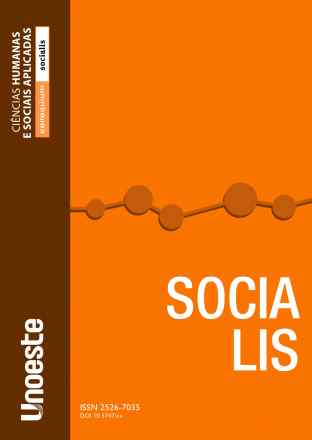MINHA CASA, MEU CATIVEIRO -ISOLAMENTO SOCIAL E O AUMENTO DA VIOLÊNCIA DOMÉSTICA EM TEMPOS DE PANDEMIA
Colloquium Socialis
MINHA CASA, MEU CATIVEIRO -ISOLAMENTO SOCIAL E O AUMENTO DA VIOLÊNCIA DOMÉSTICA EM TEMPOS DE PANDEMIA
Autor Correspondente: Danielle Yurie Moura da Silva | [email protected]
Palavras-chave: Violência Doméstica, Isolamento Social, Direitos da Mulher, COVID-19
Resumos Cadastrados
Resumo Português:
Desde o nascimento da civilização humana, ao contrário de outros animais, homens e mulheres vivem em um grupo denominado família. Mas, também desde o início, os homens, pela força física e agressividade presentes em seu DNA, alegaram ser o gênero principal, cabendoas mulheres só obedecer.A presente pesquisa envolve o estudo da violência doméstica durante o isolamento social ocasionado pelo COVID-19. O objetivofoi analisar se houve realmente um aumento nos casos de feminicídio por conta do isolamento. A metodologia utilizada foi a qualitativa, por meio da análise hermenêutica de uma série de fatos empíricos e dados disponíveis, com a finalidade de construir uma perspectiva atualizada sobre o tema e corroborar com a narrativa acerca da atual situação da violência doméstica dentro do isolamento social que identificou que essa situação sempre esteveno cotidiano feminino, interpretando as leis e os dados oriundos de pesquisas realizadas por meio de fontes específicas como DataSenado e o Fórum Brasileiro de Segurança Pública. A narrativa, em síntese, defende que ainda existe um hiato entre os direitos garantidos pela Constituição Federal de 1988 para com as mulheres e as práticas institucionais das políticas públicasedo próprio Judiciário. Os resultados evidenciam que existe um longo caminho a ser percorrido para que haja uma mudança significativa deste cenário. Assim pode-se concluir quepara que haja uma mudança neste cenário é preciso ocorrer umadesnaturalização da sociedadeatravés de uma educação libertadora que se compromete em erradicar a Violência Doméstica da nossa realidade.
Resumo Inglês:
Since the birth of human civilization, unlike other animals, men and women have lived in a group called the family. But, also from the beginning, men, due to the physical strength and aggressiveness present in their DNA, claimed to be the main gender, with women only obeying. This research involves the study of domestic violence during social isolation caused by COVID-19. The objective was to analyze whether there was an increase in cases of femicide due to isolation. The methodology usedwas qualitative, through the hermeneutic analysis of a series of empirical facts and available data, in order to build an updated perspective on the theme and corroborate the narrative about the current situation of domestic violence within the social isolation that identified that this situation has always been in the female daily life, interpreting the laws and data from research carried out through specific sources such as DataSenado and the Brazilian Forum on Public Security. The narrative, in summary,argues that there is still a gap between the rights guaranteed by the Federal Constitution of 1988 to women and the institutional practices of public policies and the Judiciary itself. The results show that there is a long way to go before there is a significant change in this scenario. Thus it can be concluded that for there to be a change in this scenario, it is necessary to occur a denaturalization of society through a liberating education that is committed to eradicate Domestic Violence from our reality.

